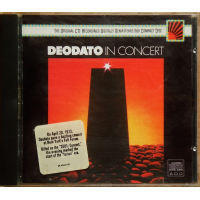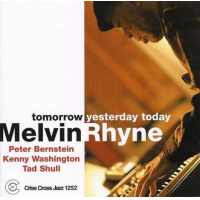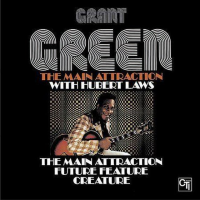Home » Jazz Articles » Liner Notes » Brad Goode: Polytonal Big Band: The Snake Charmer
Brad Goode: Polytonal Big Band: The Snake Charmer
Perhaps you've heard orchestras that use dissonance and unexpected note clusters as their operating system. Maybe you've encountered soloists who ply their playing with extended technique and postmodern pastiche, vividly escaping the gravitational pull of conventional composition. But I can't think of an album that combines these elements with the electric dynamism of The Snake Charmer—an appraisal shared, in fact, by the author of this music.
"Well, I can think of a few precedents for some of this," says Brad Goode. But, I ask him, can you think of a project that incorporates improvisation from this end of the spectrum into the basic big-band format? "I guess not," he allows.
Give a listen to the opening track, the irresistible juggernaut "Goose Chase." The title dispenses with the word "wild," but no worries; Goode's hyperkinetic trumpet solo fills in that gap, with lip-bruising leaps between registers and mind-boggling time warps as he slices and dices the beat. Instead of tracing a linear narrative, his improvisation stacks short episodes on top of each other—a cubist painting rather than a representational landscape, framed by compositional strategies Goode has developed over the years. Carl Schultz's tenor solo hews closely to the form of the piece, while pianist Victor Mestas-Perez injects Afro-Latin elements in his own break; both demonstrate valid interpretations of the music different from Goode's own.
As he explains, "I'm freely using techniques that are not as simple as the usual big-band section writing. I'm orchestrating in different ways at different times, with different combinations of techniques, and I'm using dissonant polychords as my main weapon." (Polychord is shorthand for "polytonal chords"; in layman's terms, those are chords that reference more than one key center, and they give Goode's ensemble writing a pronounced density.)
Like most of the pieces on The Snake Charmer, "Goose Chase" has appeared previously in Goode's discography—in this case, on his 2014 album Montezuma. His solo then was similarly wide-ranging, though not as outré as what he plays here. But there's another reason that the earlier performance seems less jarring: it occurs in the transparent and flexible setting of a quartet, where the rhythm section can adaptively soften the tensions that arise. The large ensemble on The Snake Charmer does just the opposite.
"I'm a spur-of-the-moment improviser," explains Goode; "I tend to react to what I'm hearing around me. In a combo setting I just let my imagination go where it wants. But in this context, I'm reacting to material I wrote for myself"—material that magnifies his harmonic palette. "I've been using polychords to create dissonances in a lot of my compositions for some time now," he adds; in fact, in 2008 he titled one album Polytonal Dance Party. "But the big band puts it more in your face."
Fitting oneself into a big-band chart often imposes constraints, but that doesn't happen here. Since Goode wrote these arrangements using the same principles on which he improvises—and since he's played these tunes a lot—the experience proves paradoxically liberating. "I'm very comfortable when I can create my own setting," he understates. This freedom leads to solos that accelerate and explode with other-worldly technique and conceptual virtuosity: four-dimensional pachinko balls ricocheting off the melody, or the stacked chords, and sometimes off of themselves.
Head on over to another previously recorded song, the quasi-middle-eastern "Pentacles," which Goode debuted on his 2023 disc The Unknown. At about 1:05, you'll hear this album's best example of pyramiding, another compositional strategy he likes to use. By staggering the entrance of multiple instruments, pyramiding allows him to construct chords that have a layered, almost tactile character. The melody itself emerges, not as a straightforward line but rather from the pointillist accumulation of individual data, in an ensemble section deftly sandwiched between the dizzyingly disruptive trumpet breaks.
Inklings of the Polytonal Big Band first surfaced more than 30 years ago. For decades, Goode's skills as a player, along with his reputation as an effective educator (at University of Colorado Boulder), have kept him in demand as a clinician and guest soloist for college and high school jazz programs. Early on, he began writing his own big-band charts, in order to have original music for these occasions. But while he's long wanted to record them, he's never had the money or opportunity—until now (thanks to a grant opportunity through the university).
As a teacher, Goode readily shares his expertise with his students; one former tutee, Noah Fulton-Beale, makes extensive use of pyramiding on the two arrangements Goode asked him to write for this album. ("I wanted some things that were a little less abstract and dissonant for the concerts. I figured it would be better to ask someone to write a 'sane' chart, because I'm not sure I'm even still capable of doing that," he jokes—I think.) Both those tracks, "Just a Thought" and "I Can't Forget About You," use jazz-rock shuffles to support a lyrical melody line; plenty of sumptuous section writing; and guitar solos from Tim Wendel. The latter composition, published in 1985, first appeared on the 2006 album Hypnotic Suggestion; so did the song of that title, expanded here to include a round-robin series of eclectic solos from the entire trumpet section.
The band's book also contains the 1940s classic "Cabin in the Sky," introduced by Ethel Waters in both the stage production and film of the same name, and here shining the spotlight on trumpeter Emily Hartrampf and trombonist Joanna Griffith; and the jazz standard "Ornithology," with its impressive soli section starting at 3:15. Still, even these relatively straightforward arrangements live on the edge of Goode's polytonality. "You could almost say that 'Cabin' is in the style of [revered mid-century arranger] Billy May," Goode points out, "or that 'Ornithology' is from the Dizzy Gillespie or Thad Jones school—if it weren't for my psychedelic approach to arranging."
And that brings us around to the track that gives this album its name. "The Snake Charmer" was first seen on the trumpeter's eponymous sextet recording from 1995. Once again, the trumpet solo refuses to stay within the lines or, for that matter, merely cross them: Goode obliterates the lines, with torrents of notes that skip over, dance upon, or simply ignore convention. Picture a trampolinist performing a slew of impossible acrobatics, enabled only by the stability of the underlying framework. Alto saxophonist John Gunther employs some of the same tactics, and the ensemble writing fills the room.
By using a traditional big band as the canvas for his shape-shifting, frankly startling improvisations, Goode upends the cart. On The Snake Charmer, notions of big-band propriety tumble away. They're replaced by lessons on how orchestral jazz can bridge the known and the new, as well as ways in which the idiom can be molded to reflect a unique instrumental style.
If you've heard something like it before, do let me know.
Liner Notes copyright © 2026 Neil Tesser.
Polytonal Big Band: The Snake Charmer can be purchased here.
Contact Neil Tesser at All About Jazz.
GRAMMY-winning author Neil Tesser has written and broadcasted about jazz in Chicago for 50 years. He can be heard Thursday evenings on KSDS-FM.
Track Listing
Goose Chase; The Snake Charmer; Just a Thought; Ornithology; Pentacles; Cabin in the Sky; Hypnotic Suggestion; I Can't Forget About You.
Personnel
Brad Goode
trumpetJohn Lake
trumpetSean Applebee
trumpetEmily Hartrampf
trumpetHugh Ragin
trumpetJohn Gunther
saxophone, tenorCamden Johnson
saxophone, altoCarl Schultz
saxophoneJonas Shofler
saxophone, tenorAlexandra Loran
saxophone, baritoneSam Griffith
tromboneGrayson Stewart
tromboneJack Bendure
tromboneJoanna Griffith
tromboneVictor Mestas Perez
pianoTim Wendel
guitarEddie Ness
bassPaul Romaine
drumsAlbum information
Title: Polytonal Big Band: The Snake Charmer | Year Released: 2024 | Record Label: Origin Records
Tags
PREVIOUS / NEXT
Support All About Jazz
 All About Jazz has been a pillar of jazz since 1995, championing it as an art form and, more importantly, supporting the musicians who make it. Our enduring commitment has made "AAJ" one of the most culturally important websites of its kind, read by hundreds of thousands of fans, musicians and industry figures every month.
All About Jazz has been a pillar of jazz since 1995, championing it as an art form and, more importantly, supporting the musicians who make it. Our enduring commitment has made "AAJ" one of the most culturally important websites of its kind, read by hundreds of thousands of fans, musicians and industry figures every month.



























